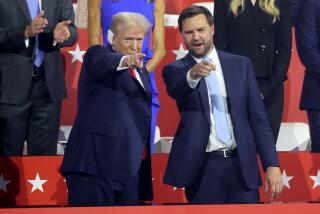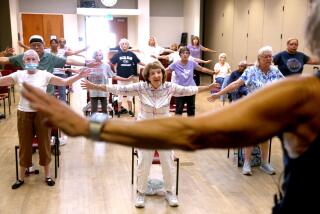Rumblings in Vermont of a Run for White House
BOSTON — The first Democrat to form an official presidential committee for 2004 has a resume many candidates would envy.
The 53-year-old five-term governor is a “common-sense moderate” who boasts on his Web site that “social justice can only be accomplished through strong financial management”--fiscal conservatism. He is a physician who championed universal health care for all under age 18 in his home state. He is married to a physician and has two photogenic kids. He also has an “A” rating from the National Rifle Assn. and a pedigree every bit as patrician as George W. Bush’s.
Unfortunately for a man seeking the presidency, almost no one has heard of Howard Dean. And he comes from a state whose population is smaller than that of several California counties.
Recently, on one of the half-dozen exploratory trips he has made to Iowa since January, he was asked, “What have you done for the women of Connecticut?”
Politely, Dean replied, “It’s Vermont.”
By telephone from Waterloo, Iowa, where he pursued his strategy of meeting with small groups such as town councils and women’s organizations, Dean acknowledged that no president has ever claimed Vermont as home. Calvin Coolidge and Chester A. Arthur were both born in the Green Mountain State but left before high school, and in 1880, John Wolcott Phelps of Guilford, Vt., earned 707 votes nationally in an American Party bid for the presidency.
On fat census days, Vermont inflates its population to 650,000. The state’s one congressman, Bernard Sanders, is one of only two independents in the House of Representatives. Despite Dean’s efforts to tout Vermont as a bastion of innovative social policy, the state is best known for miserable winters and homemade merchandise: Vermont Teddy Bears, Green Mountain Coffee and, of course, Ben & Jerry’s ice cream.
“There are many people who believe Vermont is a town in New Hampshire,” said Garrison Nelson, a professor of political science at the University of Vermont. “People think the whole state’s cute. Howard’s cute too.”
But from Washington, Democratic political consultant Tad Devine said Dean’s strengths may overshadow his obscurity.
“He’s a governor, and he’s also a physician. At a time when health care is such an important issue, his ability to talk about it from the stance of achievement is very much in his favor,” said Devine, who managed former Vice President Al Gore’s 2000 presidential race.
For Dean, Devine said, “the real litmus test will be whether he can raise financial support to compete. I don’t think we know the answer to that.” As for Dean’s chances in a field of Democrats that may include Sens. John F. Kerry of Massachusetts, Joseph I. Lieberman of Connecticut, John Edwards of North Carolina as well as House Minority Leader Richard A. Gephardt of Missouri and, perhaps, Gore, Devine said: “It’s very hard to say right now. But if no one else runs, his chances are extraordinary.”
Sometimes Dean is known as “the Yankee Jimmy Carter,” and sometimes he is likened to Harry S. Truman--a governor who enjoys bucking the tide. But he also shares qualities with George W. Bush, starting with a privileged background. Dean’s blueblood runs so thick, in fact, that Bush’s grandmother was a bridesmaid at Dean’s grandmother’s wedding.
Dean was raised in East Hampton, N.Y., as a stockbroker’s son. He attended the Browning School in Manhattan, St. George’s for prep school and that well-known incubator of chief executives, Yale University. Briefly, Dean tried his own hand at high finance. But Wall Street was not for him, and he headed to medical school. There he met his wife, Judith Steinberg. Together they moved to Vermont and set up a family medical practice outside Burlington.
In a staunchly Republican state, Dean soon thrust himself into Democratic politics. He was elected to the state Legislature (where his nickname was HoHo) in 1983, he became lieutenant governor three years later. In 1991, Gov. Richard Snelling died in office. Dean was examining a patient at his medical office when he got the news. He finished the exam and drove to Montpelier.
As governor, Dean has focused on jobs, education and, most of all, health care. He put into effect one of the nation’s most sweeping mental health programs. He also signed a bill that made Vermont the first state to legalize same-sex partnerships.
Dean also became chairman of the National Governors’ Assn., as well as the Democratic Governors’ Assn.
“He is handsome, he conducts himself well and he is smart. I don’t think he is smart enough, but as politicians go, he is smart,” said John McClaughry, who was “obliterated” by Dean when both ran for lieutenant governor.
“He has had a charmed political career and a charmed decade to be governor in,” said McClaughry, president of a “free-market think tank” called the Ethan Allen Institute in Kirby, Vt.
McClaughry suggested Dean launched his presidential bid because “he’s in the prime of life and he has exhausted his opportunities around here.” Unless Dean waits to run against independent Sen. James M. Jeffords in 2006, “there’s nothing here for Howard except going back to the clinic,” McClaughry said.
“And he’s not looking forward to going back to looking down people’s throats.”
But Dean sounded positively New Frontierish when he explained his motivation for seeking the presidency.
“I think the country is fundamentally going in the wrong direction. I think the fiscal management of the country is a disaster--we’re right back to the borrow-and-spend politics of the 1980s,” he said. “I also want health care for every single American.”
As to why he should be the one to make these changes, Dean said, “Somebody has to do it. This country didn’t get to be a great country by letting someone else do it.”
His “Dean for America” presidential committee consists of a treasurer, one paid college student, one unpaid college student and a volunteer he is waiting to hear from. He is not rolling in political dough. But Dean is at least piling up frequent-flier miles, last week heading, for example, from Vermont to Iowa and back, then to Buffalo, N.Y., then to Seattle.
Linda Fowler, a professor of government at Dartmouth College, said the front-loaded primary schedule could work against “a Jimmy Carter-style candidate who comes out of the woodwork”--or, in Dean’s case, the backwoods.
“If you were being smart, you would look at it and say no way,” Fowler said. “That said, nobody predicted that George Bush Sr.’s popularity would fall into the cellar in 1992, but it did. If I were a betting woman, I would say no to Howard Dean’s chances, but I would not have predicted that Bill Clinton was going to be our president, either.”
Nelson, a longtime antagonist of the governor, at first dismissed Dean as “a twerp.” But in the course of a long interview, he concluded: “Basically, I have underestimated this man for 20 years, and I have been wrong most of the time.
“Howard is the master of good timing, and lightning may just strike Howard this time.”
More to Read
Sign up for Essential California
The most important California stories and recommendations in your inbox every morning.
You may occasionally receive promotional content from the Los Angeles Times.










